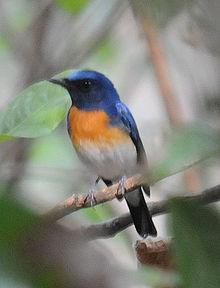Cyornis
Appearance
| Cyornis | |
|---|---|

| |
| Blue-throated blue flycatcher (C. rubeculoides) | |
| Scientific classification | |
| Domain: | Eukaryota |
| Kingdom: | Animalia |
| Phylum: | Chordata |
| Class: | Aves |
| Order: | Passeriformes |
| Family: | Muscicapidae |
| Genus: | Cyornis Blyth, 1843 |
| Synonyms | |
|
Rhinomyias Sharpe, 1879 | |
Cyornis is a genus of birds in the Old World flycatcher family Muscicapidae most of which are native to Southeast Asia.
Species
The genus contains the following species:[1]
- Hainan blue flycatcher (Cyornis hainanus)
- Pale blue flycatcher (Cyornis unicolor)
- Rück's blue flycatcher (Cyornis ruckii)
- Blue-breasted blue flycatcher (Cyornis herioti)
- White-bellied blue flycatcher (Cyornis pallidipes)
- Pale-chinned blue flycatcher (Cyornis poliogenys)
- Hill blue flycatcher (Cyornis whitei)
- Javan blue flycatcher (Cyornis banyumas)
- Dayak blue flycatcher (Cyornis montanus) Sometimes considered a subspecies of Cyornis banyumas[2]
- Meratus blue flycatcher (Cyornis kadayangensis) – described in 2021
- Large blue flycatcher (Cyornis magnirostris)
- Palawan blue flycatcher (Cyornis lemprieri)
- Tickell's blue flycatcher (Cyornis tickelliae)
- Indochinese blue flycatcher (Cyornis sumatrensis)
- Sunda blue flycatcher (Cyornis caerulatus)
- Bornean blue flycatcher (Cyornis superbus)
- Blue-throated blue flycatcher (Cyornis rubeculoides)
- Chinese blue flycatcher (Cyornis glaucicomans) Sometimes considered as a subspecies of Cyornis rubeculoides[3]
- Malaysian blue flycatcher (Cyornis turcosus)
- Mangrove blue flycatcher (Cyornis rufigastra)
- Tanahjampea blue flycatcher (Cyornis djampeanus) Sometimes considered as a subspecies of Cyornis rufigastra[4]
- Sulawesi blue flycatcher (Cyornis omissus)
- Timor blue flycatcher (Cyornis hyacinthinus)
- Blue-fronted blue flycatcher (Cyornis hoevelli)
- Matinan blue flycatcher (Cyornis sanfordi)
- White-tailed flycatcher (Cyornis concretus)
- Flores jungle flycatcher (Cyornis oscillans)
- Sumba jungle flycatcher (Cyornis stresemanni) Sometimes considered a subspecies of Cyornis oscillans[2]
- Brown-chested jungle flycatcher (Cyornis brunneatus)
- Nicobar jungle flycatcher (Cyornis nicobaricus)
- Fulvous-chested jungle flycatcher (Cyornis olivaceus)
- Grey-chested jungle flycatcher (Cyornis umbratilis)
- Crocker jungle flycatcher (Cyornis ruficrissa) Sometimes considered a subspecies of Cyornis ruficauda[2]
- Philippine jungle flycatcher (Cyornis ruficauda)
- Sulu jungle flycatcher (Cyornis ocularis) Sometimes considered a subspecies of Cyornis ruficauda[2]
- Sula jungle flycatcher (Cyornis colonus)
- Banggai jungle flycatcher (Cyornis pelingensis)
Seven of the above species, all with "jungle flycatcher" in their English names, were previously placed in the genus Rhinomyias but were moved to Cyornis based on the results of a 2010 molecular phylogenetic study.[5] There are also "jungle flycatchers" in the genus Vauriella.[1]
References
- ^ a b Gill, Frank; Donsker, David; Rasmussen, Pamela, eds. (August 2022). "Chats, Old World flycatchers". IOC World Bird List Version 12.2. International Ornithologists' Union. Retrieved 27 August 2022.
- ^ a b c d "Species Updates – IOC World Bird List". Retrieved 2021-05-27.
- ^ Clement, P. "Blue-throated Blue-flycatcher (Cyornis rubeculoides)". In del Hoyo, J.; Elliott, A.; Sargatal, J.; Christie, D.A.; de Juana, E. (eds.). Handbook of the Birds of the World Alive. Lynx Edicions. Retrieved 4 June 2016.(subscription required)
- ^ Clement, P. "Mangrove Blue-flycatcher (Cyornis rufigastra)". In del Hoyo, J.; Elliott, A.; Sargatal, J.; Christie, D.A.; de Juana, E. (eds.). Handbook of the Birds of the World Alive. Lynx Edicions. Retrieved 4 June 2016.(subscription required)
- ^ Sangster, G.; Alström, P.; Forsmark, E.; Olsson, U. (2010). "Multi-locus phylogenetic analysis of Old World chats and flycatcher reveals extensive paraphyly at family, subfamily and genus level (Aves: Muscicapidae)". Molecular Phylogenetics and Evolution. 57 (1): 380–392. doi:10.1016/j.ympev.2010.07.008. PMID 20656044.
Further reading
Wikimedia Commons has media related to Cyornis.
- Del Hoyo, J.; Elliot, A. & Christie D. (editors). (2006). Handbook of the Birds of the World. Volume 11: Old World Flycatchers to Old World Warblers. Lynx Edicions. ISBN 84-96553-06-X.
- Robinson HC and NB Kinnear (1928). "Notes on the Genus Cyornis Blyth". Novitates Zoologicae. 34: 231–261.
